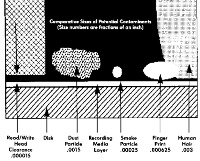Came across this interesting thread on the AUSNOG mailing lists today. I don't have any equipment in this datacentre myself so am not affected but there must be plenty of unhappy people around after this event:
http://lists.ausnog.net/pipermail/ausnog/2014-January/thread.html#22079
http://lists.ausnog.net/pipermail/ausnog/2014-January/022079.html
Anyone seen something like this occur before? Might be more of a concern for LEB providers who are using cheaper SATA drives if you are in a facility with this type of system and suddenly have a huge number of drives to replace. Some replies have indicated that the system in use is not the same as in other competing datacentres in the same city (Equinix for example, where my own business has some equipment).
Granted it's not something that happens often but when it does if you have to replace a bunch of drives at once could certainly be quite frustrating!
Related links:
Inert Gas Data Center Fire Protection and Hard Disk Drive Damage
http://www.datacenterjournal.com/it/inert-gas-data-center-fire-protection-and-hard-disk-drive-damage/
Siemens white paper
http://www.hgi-fire.com/wp-content/uploads/2013/03/White-Paper-potential-problems-with-computer-hard-disks-V1.3.pdf
http://lists.ausnog.net/pipermail/ausnog/2014-January/thread.html#22079
http://lists.ausnog.net/pipermail/ausnog/2014-January/022079.html
Appears a gas fire suppression system release caused a noise or air pressure change that caused many hard drives in the facility to fail; with certain drives and servers being generally more vulnerable.Hi All,
I have quite a few people today with hard drives fail in suites on
level 4 at global switch. GS tell us the Gas was dropped in response to
some smoke from some plant. Not sure how inergen would effect hard
drives but there are many people wondering around on level 4 looking
like there dog just died.
Anybody have any more info.
Matt
Anyone seen something like this occur before? Might be more of a concern for LEB providers who are using cheaper SATA drives if you are in a facility with this type of system and suddenly have a huge number of drives to replace. Some replies have indicated that the system in use is not the same as in other competing datacentres in the same city (Equinix for example, where my own business has some equipment).
Granted it's not something that happens often but when it does if you have to replace a bunch of drives at once could certainly be quite frustrating!
Related links:
Inert Gas Data Center Fire Protection and Hard Disk Drive Damage
http://www.datacenterjournal.com/it/inert-gas-data-center-fire-protection-and-hard-disk-drive-damage/
Siemens white paper
http://www.hgi-fire.com/wp-content/uploads/2013/03/White-Paper-potential-problems-with-computer-hard-disks-V1.3.pdf


